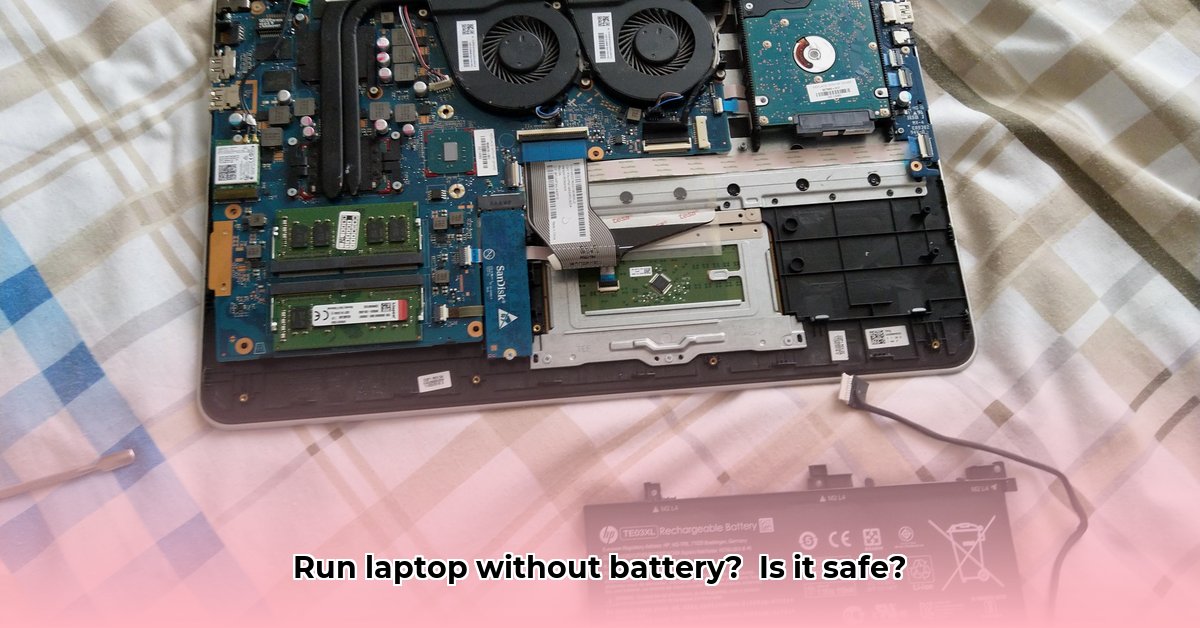
Is it safe to run your laptop without its battery? For most modern laptops, the answer is generally yes, but understanding the associated risks is crucial. This guide will explore the potential issues, provide practical advice, and help you make an informed decision about operating your laptop without a battery.
Safety and Risks: Understanding the Potential Issues
Modern laptops are typically designed to operate directly from a power adapter. The internal battery management system usually continues functioning even without a battery installed. Many users operate their laptops this way daily without incident. However, removing the battery does introduce specific risks.
The primary concern is power outages. Without a battery to provide a temporary power supply, your laptop will immediately shut down upon power loss. This leads to the immediate loss of any unsaved work, representing a significant risk if you're working on critical projects or documents. There's also a small possibility of data corruption if a power failure occurs while the laptop is writing data to the hard drive. Frequent saving is paramount to mitigate data loss.
Older laptops or those with faulty batteries present a different scenario. An aging or malfunctioning battery could overheat, potentially causing damage to internal components. Removing the battery in such cases might prevent further damage. Always consult your laptop's manual or the manufacturer's website for specific guidance; they may explicitly recommend battery removal for certain issues.
Here's a risk assessment matrix summarizing the potential dangers:
| Action | Data Loss Risk | Hardware Damage Risk | Overheating Risk |
|---|---|---|---|
| Running laptop without battery (Modern Laptop) | Moderate | Low | Low |
| Running laptop without battery (Faulty Battery) | Low | Moderate | High |
| Using an Underpowered Adapter | High | High | High |
Actionable Advice: Keeping Your Laptop Safe
Follow these steps to minimize risks when running your laptop without a battery:
Assess your risk tolerance: Carefully consider the potential consequences of data loss. If you're working on crucial information, keeping the battery installed might be the safer option.
Use the correct power adapter: Always use the power adapter specifically recommended by your laptop's manufacturer or one providing equal or greater wattage. Using an underpowered adapter can lead to overheating and damage.
Monitor for overheating: Pay close attention to your laptop's temperature, especially after removing a potentially faulty battery. If the laptop feels excessively hot, immediately cease operation and seek professional assessment if necessary.
Save frequently: This is crucial. Develop the habit of saving your work every few minutes, or more often for critical tasks.
Consult your manufacturer: Always refer to your laptop's manual or the manufacturer's website for specific recommendations. Their guidance supersedes general advice.
Long-Term Strategies: Proactive Care
If you intend to regularly use your laptop without a battery, consider replacing your battery before it fails. A worn-out battery poses a significantly higher risk of failure and related problems. Think of this as preventative maintenance; addressing potential issues proactively helps extend your laptop's lifespan.
Manufacturer Recommendations: The Final Word
The manufacturer's instructions for your specific laptop model are the most authoritative source of information. Their recommendations take precedence over any generalized advice. Always consult your manual or their website before making any decisions.
Frequently Asked Questions (FAQ)
Q: Will removing my battery damage my laptop? A: Generally no, for modern laptops. However, improper removal or a pre-existing faulty battery can lead to issues.
Q: How can I tell if my battery is bad? A: Signs include excessive heat generation, significantly reduced battery life, or the laptop refusing to charge.
Q: Can I still charge my laptop without the battery? A: Yes, provided you use the correct power adapter.
Q: Does running a laptop without a battery save money? A: Not significantly. The long-term cost savings are negligible, as you will still need to replace the battery eventually.
By carefully evaluating the risks and following these simple steps, you can determine if running your laptop without a battery is suitable for your needs. Remember that staying informed and taking preventative measures are key to safe and efficient usage.